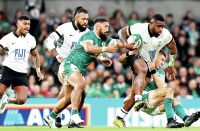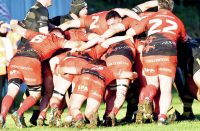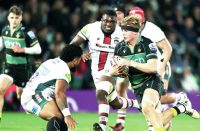 Globalisation is one of the modern day buzzwords and although sometimes I’m not exactly sure what it means the fact that next Saturday Newcastle Falcons will be playing their ‘home’ Premiership game against Saracens in the Philadelphia suggests that in rugby terms something is afoot.
Globalisation is one of the modern day buzzwords and although sometimes I’m not exactly sure what it means the fact that next Saturday Newcastle Falcons will be playing their ‘home’ Premiership game against Saracens in the Philadelphia suggests that in rugby terms something is afoot.
On the very same day the European champions will be running out at the Talen Energy Stadium in Chester, a satellite city of Philadelphia on the banks of the Delaware river, the Southern Kings will be playing Leinster in their Pro 14 fixture at Port Elizabeth. Meanwhile on the Sunday the Cheetahs will be entertaining Zebre in Boemfontein.
It’s all getting a bit mind-bending, what with New Zealand playing Ireland in that epic game in Chicago just under a year ago and Scotland playing in Singapore back in June. It’s rugby but not as we know it.
Of course the hunt for new markets, new fans, bigger TV deals and more money is at the very heart of this along with, one trusts, a slightly more altruistic desire to grow the game.
As far as I can tell this craze for taking competitive games to far flung locations – some with little or no connection to the competition involved – all started with a bizarre match in a tented field in the grounds of a six star hotel in Abu Dhabi.
Wasps’ home match against Harlequins in the Anglo-Welsh Cup in January 2011 is still one of the odder rugby occasions of recent years. The match was held on the estate of the Emirates Palace Hotel, below, where a couple of small temporary stands were constructed and a small tented village erected to cater for a crowd of about 4,000 expats who couldn’t quite believe their luck having a bone fide competitive rugby match on their doorstep within the confines of an establishment where beer could be openly served.
The raison d’etre for the game was never quite clear. The Middle East is not fertile ground for a club wishing to grow their brand let alone the game and there was never going to be such a walk-up that the gate alone might prove a significant earner. It was televised live back home but that would also have been the case had it been staged at Adams Park.
It did attract a flurry of media interest but that quickly died and there was just no obvious follow up. It didn’t feel like the beginning of anything, in fact it felt like a late night discussion that got out of hand and an idea that should probably have been shelved in the sober light of day.
Wasps – and their then owner Steve Hayes – were the instigators and one assumes there was some kind of down payment from the Abu Dhabi authorities for effectively ‘buying’ the game but, as a one-off, that still makes little sense. Perhaps it was just a punt by an impoverished Wasps club who were struggling financially more than we knew and were desperately looking around for ways to make the books balance and attract a sponsor.
As for the rugby it was, despite the exotic setting, a surprisingly routine game with Harlequins in very business-like mood as they outscored Wasps five tries to two en route to a 38-13 win. Played under floodlight in the relative cool of the evening there were tries for Ceri Jones, Simon Smith, George Lowe and a brace for Karl Dickson while for Wasps Joe Launchbury and Tom Varndell got on the scoresheet. After a hot evening’s work players and fans alike had the choice of 15 bars within the hotel compound.
 The London Irish Pemiershp match with Saracens in Boston in March 2016 made more sense, the first of three such games each year had Irish survived the relegation. The Exiles, whose home game it was, were keen and with Boston’s strong Irish connections there was a more than decent 14,000+ crowd at the Red Bull arena but, in retrospect, you wonder about the dislocation of the entire week for a team mired deep in an ultimately unsuccessful relegation battle.
The London Irish Pemiershp match with Saracens in Boston in March 2016 made more sense, the first of three such games each year had Irish survived the relegation. The Exiles, whose home game it was, were keen and with Boston’s strong Irish connections there was a more than decent 14,000+ crowd at the Red Bull arena but, in retrospect, you wonder about the dislocation of the entire week for a team mired deep in an ultimately unsuccessful relegation battle.
Saracens, minus their international contingent who were on Six Nations duty, had nothing to lose and are, of course, famously a team who like to disappear to some exotic location for a few days mid-season. They seemed energised by the experience and certainly had no qualms about being asked to cross the Atlantic again for the match against the Falcons next week.
The Top14s main concession to overseas jaunts has been the holding of the 2016 Final in front of a 99, 124 crowd at Camp Nou in Barcelona, but Super Rugby has now been played in eight separate nations despite consisting of teams from only four countries.
There are other agendas to consider. First there is the very particular case of Japan’s Sunwolves franchise who entered the fray two seasons ago. During both those seasons they have played three games at the splendid National Stadium in Singapore, one of the most versatile and best appointed stadia on the Super Rugby circuit.
The logic is pretty clear. The Sunwolves may be a Japanese franchsie but they also want to present themselves as ‘Asia’s team’ while the ex- pat population in Singapore offers up a very receptive rugby audience. The Sunwolves are currently contracted to play three matches a season there until 2020.
It hasn’t proved a lucky ground yet but the action has been full on and entertaining. In the first year they lost to the Cheetahs (a 31-32 classic) and the Bulls (27-30) before drawing 17-17 with the Stormers. This year there were another three defeats but again all the games were close and entertaining. Singapore has been a success story.
Teoping Low, president of the Singapore Union, says: “It has given local rugby fans the opportunity to watch top class rugby played on Singapore soil and this is inspiring local rugby fans to support the sport as players and/or as fans.
“The performance have been an inspiration to local rugby players. The Sunwolves players and coaches are also spending time with local teams, providing clinics and training with the local national team players.”
SANZAAR CEO Andy Marinos is also a fan of Singapore as a venue: “Singapore is a vibrant and exciting destination and is part of a region that is taking to rugby in large numbers. Having the Super Rugby brand exposed to South East Asia via Singapore and the Sports Hub is fantastic and fits in with our plans for the evolution of Super Rugby. SANZAAR encourages rugby fans in the region to continue to support and adopt the Sunwolves as their own Super Rugby team. ”
If money and the world of commerce provides a good part of the rationale behind Singapore’s
frequent appearance in Super Rugby, recent matches in Suva and Apia are of a different ilk altogether. There is, as we all acknowledge, no money to be made by playing and staging rugby in the Islands so it’s tempting, if a little cynical to ask why the Chiefs and Crusaders staged a prestige game there in Suva at a crucial stage of the Super Rugby season. The Blues also hosted their match against Queensland Reds in Apia five days before their game against the Lions back in Auckland.
It gives Super Rugby a certain cache and kudos to hold games there in such exotic locations and, of course, promotes the idea that Fiji and Samoa are somehow involved in the competition and part of the SANZAR family which they manifestly are not. It also helps grow a distant fan base as satellite TV gets into the islands with the subliminal message that entails is strong. Not that young Fijian or Samoa rugby players need great prompting to seek their fame and fortune in New Zealand but from now on they are likely to look most kindly on the Blues, Crusaders and Chiefs.
The staging of games on the Islands hasn’t been without controversy though. Although a good crowd were present for the game in Suva the match in Samoa was poorly attended with excessive ticket prices – ranging from $NZ20 to $NZ 250 – widely blamed. Samoa remains a poor island – much poorer economically than Fiji – and those prices are what they charged for New Zealand’s Test against Samoa two years ago.
Of course there has been one other far flung Super Rugby contest but the circumstances were unique and hopefully won’t ever be repeated.
Following the Christchurch earthquake on 2011 the Crusaders were without a ground and there was also a desire to defiantly fly the flag – business as usual – while the rugby community generally wanted to lend a hand at possible.
So at short notice the Crusaders moved – lock, stock and barrel – their scheduled home match against the Sharks to Twickenham where all the big names sans Richie McCaw who was injured put on a show to win 44-28 in front of a 35,094 crowd with close on £200,000 being raised for the disaster fund.
A heart-warming rugby day but it’s difficult to make out a case for regularly staging Super Rugby matches in Britain? Or is it? The Pumas have already ‘hosted’ a Rugby Championship game against Australia at Twickenham.
Who knows where globalisation will lead us?























